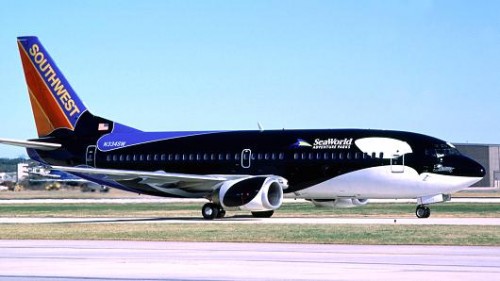The documentary film “Blackfish” has created a wave of controversy over claims of animal cruelty for SeaWorld Entertainment’s chain of marine animal theme parks. Amid calls for boycotts, performers such as Willie Nelson and Trisha Yearwood are refusing to play concerts at SeaWorld venues, but some of the company’s marketing partners, such as Southwest Airlines said that, for now, no changes are planned.
Southwest is “in a listening and education mode,” airline spokeswoman Marilee McInnis said last week in blog post responding to the delivery of a Change.org petition with 27,000 signatures urging the airline to break ties with SeaWorld. For now, “our partnership with SeaWorld will continue,” she said.
SeaWorld and Southwest have worked together since 1988 in what McInnis told CNBC is a “mutually beneficial partnership” that “is based on travel and bringing families together.”
Co-branded programs include vacation packages and several Boeing 737 specialty jets painted with images of marine park animals. Two planes, Shamu Two and Shamu Three (Shamu One has been retired), feature images of Sea World’s performing orcas. A huddle of gentoo penguins are painted on the newest themed plane, Penguin One.
Southwest Airlines isn’t the only corporate entity being pressured to sever ties with SeaWorld. On Change.org alone, there are more than two dozen “Blackfish”-inspired petitions, including one asking Toys R Us to stop selling a SeaWorld-themed Barbie and another asking Groupon to stop featuring discounted SeaWorld deals.
The “Blackfish” documentary by filmmaker Gabriela Cowperthwaite examines the history of killer whales in captivity and, in particular, the story of Tilikum, a captive orca that has been associated with the death of several people, including of a trainer in 2010 at SeaWorld Orlando in Florida. Petitioners have called for the release of Tilikum and changes to the way in which SeaWorld treats animals in its theme parks.
“These campaigns against our partners are generally orchestrated by animal rights organizations whose views are extreme and entirely out of step with U.S. public opinion,” said SeaWorld spokesman Fred Jacobs, who calls them a form of “digital harassment.”
“We do not have any plans at this time to remove the Barbie I Can Be SeaWorld line from our stores,” said Kathleen Waugh, vice president of corporate communications for Toys R Us. Groupon declined to comment for this story.
SeaWorld defends its practices and, in a variety of public statements, accuses the “Blackfish” film producers of painting “a distorted picture that withholds from viewers key facts about SeaWorld—among them, that SeaWorld is one of the world’s most respected zoological institutions, that SeaWorld rescues, rehabilitates and returns to the wild hundreds of wild animals every year and that SeaWorld commits millions of dollars annually to conservation and scientific research.”
Still, citing the “Blackfish” documentary and petitions signed by fans, performers such as Martina McBride, 38 Special, REO Speedwagon, Cheap Trick, Trisha Yearwood, Heart and Willie Nelson have canceled their events at SeaWorld venues.
“I understand there are petitions going around with thousands of people’s names on it, so I had to cancel,” Nelson said in a CNN interview. “Also, I don’t agree with the way they treat their animals, so it wasn’t that hard a deal for me to cancel.”
For other performers and companies being urged to cut ties with SeaWorld, the decision may not be as easy, said Shailendra Jain, chair of the department of marketing and international business at the Foster School of Business at the University of Washington in Seattle.
Some may choose to encourage dialog “to get to the bottom of the matter,” said Jain. Others may need to “examine analytically the costs and benefits of discontinuing SeaWorld as a co-brand,” staying with them for the long run or, in the short run, adopting a “wait and watch stand—as Southwest is doing,” he said.
Meanwhile, the “Blackfish” film controversy doesn’t seem to be having a negative effect on SeaWorld’s bottom line.
On Monday the company, which operates 11 theme parks in locations including San Diego, Orlando and San Antonio, said it reported preliminary revenue for 2013 of about $1.46 billion. That would represent a record revenue year for SeaWorld Entertainment, which is celebrating its 50th anniversary this year.
For its peak summer quarter, which ended Sept. 30, the parks hosted 8.9 million customers who paid an average $38.38 for admission and an additional $22.36 on food, merchandise and other items, according to the financial filing.
SeaWorldEntertainment held its initial public offering in April and is majority owned by 10 limited partnerships owned by affiliates of The Blackstone Group and co-investors.
(My story about Southwest Airlines and others being urged to sever ties with SeaWorld first appeared on CNBC Road Warrior.)
Thanks for visiting Stuck at the Airport. Subscribe to get daily travel tidbits. And follow me on Twitter at @hbaskas and Instagram.
